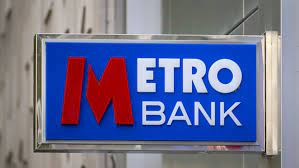Metro Bank, one of the top British banks, witnessed a significant 28% drop in its share price recently amid reports that it’s seeking to raise £600 million to strengthen its balance sheet.
According to the Financial Times, the bank is currently in discussions with investors about securing £250 million in equity funding and an additional £350 million in debt financing.
Metro Bank, in a statement, clarified that no final decision had been made yet. However, some reports suggest that a spokesperson indicated a potential £100 million equity raise.
The primary concern lies in the bank’s market capitalization, which now stands at just £63 million, marking a staggering 62% decline over the past month. This sharp decrease contrasts sharply with its peak market cap of £3.5 billion in 2018.
In 2019, the bank admitted that its risk-weighted assets amounted to £8.9 billion, which was £900 million higher than initially reported, primarily due to an accounting error.
Subsequently, the bank endured losses until the first quarter of this year. However, a regulatory decision not to reduce the capital requirements linked to its mortgage business reignited the crisis.
There are now suggestions that Metro Bank is exploring options to sell £3 billion of its mortgage book, with potential buyers including NatWest and the Lloyds Banking Group.
Both the Treasury and the Bank of England are closely monitoring the situation, as Metro Bank serves 2.7 million customers.
Founded in 2010, Metro Bank was the first bank to enter the UK market in a century, positioning itself as a challenger bank.
However, it underestimated risk, resulting in increased operational costs and a sharp decline in its share price, amounting to an overall 92% decrease.
It’s important to note that the issues primarily pertain to Metro Bank and its exposure to commercial loans, rather than systemic problems within the banking sector.
Russ Mould, an investment director at AJ Bell, noted, “Metro Bank has been struggling for years to get on a path to sustained profitability and has made lots of mistakes.”
A potential failure of Metro Bank could have far-reaching consequences, as it would mark the first high street bank failure in the UK since Northern Rock collapsed in 2007, a year prior to the Lehman Brothers collapse that triggered the Great Recession.
Interest rates in the United Kingdom have risen to 5.25%, up from near zero just two years ago. Since most mortgage interest rates are fixed for two or five years at most, the majority of British mortgage holders may face higher rates when refinancing, potentially impacting residential and commercial property prices.
This could particularly affect interest-only mortgages, as the entire balance must be paid off at the end of the term, typically through property sales.
If property prices are lower, commercial property owners may face default. However, there are currently no indications that Metro Bank’s issues are systemic, apart from the initial accounting error.
